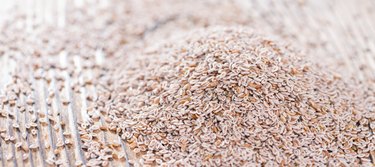
Psyllium husk is the gel-like coating on seeds of the plant species Plantago ovata. It is used by itself or as part of whole seeds to prepare the bulk laxative commonly known as psyllium. Use of psyllium can potentially trigger a range of gastrointestinal symptoms or lead to the formation of an abnormal mass in your small intestine called a bezoar. Talk to your doctor before taking a psyllium product.
Background
Video of the Day
Psyllium is also known as blond psyllium. It belongs to a class of fiber called soluble fiber, which expands or bulks in the presence of water. When it passes through your digestive tract, psyllium can produce beneficial effects by easing symptoms of intestinal problems such as diarrhea, constipation, hemorrhoids and irritable bowel syndrome. Psyllium use may also help you properly regulate your blood glucose levels, and a diet high in soluble fiber can potentially help you reduce your risks for developing heart disease. You can purchase psyllium husk or whole psyllium seed products in forms that include ground or powdered preparations, commercial laxative formulas, wafers, capsules and tablets.
Video of the Day
Mass Formation
When psyllium expands in water, it produces a mass of material that can be difficult to swallow. This mass grows thicker in a short time. For these reasons, you need to stir psyllium preparations thoroughly in at least 8 ounces of water and swallow them as soon as you finish mixing them. When taking commercial laxative formulas, you need to follow all of the product's directions and dosing instructions as closely as possible. To avoid potential complications, people who are not accustomed to taking psyllium husk or whole seed products should begin with lower-than-normal doses and gradually increase them over time.
Duodenal Bezoars
A bezoar is a mass of material that forms in the intestines when fiber, hair or other indigestible materials clump into a ball that passes through the stomach but doesn't get eliminated in feces. Some people who took a commercial laxative product that contained roughly 82 percent psyllium developed bezoars in the first section of the small intestine, called the duodenum. Potential symptoms of a bezoar include abdominal pain, indigestion, an upset stomach, diarrhea, nausea, vomiting and gastric ulcers. Some people with bezoars also have abdominal lumps that can be felt by hand.
Additional Side Effects
Apart from bezoar formation, additional potential gastrointestinal side effects of psyllium use include cramps, intestinal gas, constipation and rectal pain. Psyllium can also block your digestive tract, especially if you take it prior to bowel surgery or with insufficient amounts of water. People with gastrointestinal problems such as fecal impaction, narrowing or obstruction of the gastrointestinal tract, or any condition that can lead to a gastrointestinal obstruction should not take psyllium, according to the U.S. National Library of Medicine's MedlinePlus. If you have a bezoar in your intestines, potential treatment options include surgical removal and removal through a specialized scope introduced into your mouth and extended down through your stomach. Consult your doctor for more information on the intestinal risks associated with psyllium husk or whole psyllium use.